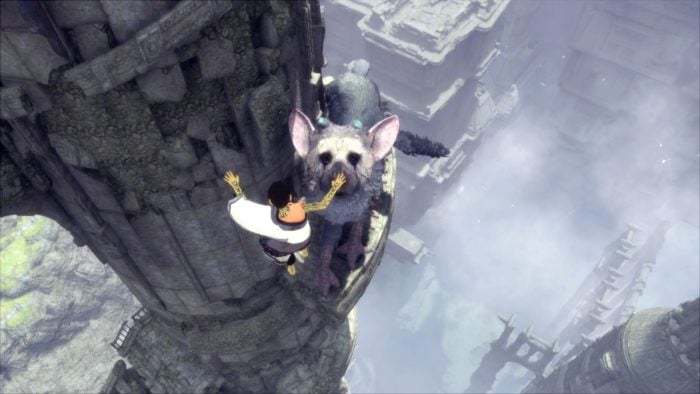The Last Guardian on PS4
The Last Guardian is the kind of game that burrows into your heart and carves out a space of its own. Its delicate story reaches out in painful and permanent ways, and while technical stumbles spot the gameplay, it leaves its mark all the same.
Starring a young, nameless boy and a massive beast called Trico, The Last Guardian begins in the depths of unknown ruins and an undiscovered backstory. Trico and the boy must travel through both, and with so little knowledge available at the onset, their journey becomes a puzzle-platforming adventure devoted solely to their profound connection.
Their friendship is tentative at first, while my tools for navigating the detailed environments are similarly restrained. Early progress is slow and awkward as I learn to recognize opportunities in crumbling walls and rusted chains. Unlike simpler traversal systems found in games like Uncharted, pathways aren’t highlighted with splashes of color or light. In fact, the levels seem filled with distractions: crates that serve no need, grabbable ledges that lead nowhere, and spaces that sprawl impartially in every direction. The first half of play forces the player to grow comfortable with this design, so that the latter half can unfurl smoothly from experience.
As the boy, I manage our way through complex enclosures, exploring tight spaces, crawling across small ledges, pulling levers, and managing new ways to goad Trico into progress with treats, calls, and commands. Trico, in return, carries me across large expanses, leaping up and down buildings, and defending me from harms both physical and gravitational.
Trico’s irresistibly realistic nature is a mechanic all its own, the animal’s curiosity subtlety pointing to objectives, and its obstinance breathing life into each interaction. I watch with anticipation as Trico teeters over the edge of a lake or in the face of a dauntingly large jump. Each refusal adds to my growing lexicon of body language. I’m more likely, as time goes on, to recognize obstacles my partner is willing to face. I begin to notice, as I run down a hallway, Trico’s brief fascination with the torches on the wall. In the next room, I must use a similar light to edge my friend forward. Trico makes a million independent moves, and each seems to carry lifelike meaning.
On occasion, Trico cranes its head in the direction opposite my destination, or stares blankly as I issue a command. These moments demand no small amount of patience, yet the frustration that bubbles often makes me chuckle rather than frown. Anyone who has lived with a pet will recognize the lack of control, the need to understand the limits and motivations of an animal whose loyalty constantly challenges its instincts. A few moments feel more the result of unresponsive controls than purposeful friction but, to a degree, each of my failed attempts to command Trico give the character a believable mind of its own. Less symbolic were times I struggled to climb or dismount Trico’s body; the boy can get stuck on the borders of its limbs as I remove spears or lend a calming pat on the head. These difficulties melt away as I meticulously pet away blood from my cooing friend post-battle. Time and again, The Last Guardian is ceaselessly touching in ways that overcome its mechanical challenges.
The Last Guardian’s final issue arises in frame-rate. A few action sequences experience a slowdown on the PlayStation 4, though this is a rare occurrence on the heftier hardware of the PS4 Pro. Even so, most scenes are gorgeous and serene without a hitch, filled with dozens of billowing feathers, airy butterflies, and hundreds of blades of grass individually reflecting yellow sunlight.
The sights only get more stunning as the game progresses and the duo travel further into the air. I climb magnificent mobiles hanging in an endless sky; their intricate parts creak and sway cautiously. Coupled with the sound of wind rushing past my ears, these settings make me twinge with fear at each leap I risk. I can’t help but commend the sound design’s role in immersion overall. Trico’s vivid whines and roars are layered with texture, and the rolling skies howl so believably that twice I removed my headset to confirm there wasn’t a storm outside my house.
An equal level of mastery lies behind the musical score. Choirs swell in moments of glory, and strings creep forward with unnerving intensity whenever the boy finds himself against our immediate antagonists: animated suits of armor looking to drag him to his doom. Their purpose, and all other facets of the game’s mysterious story, unravel elegantly over the course of my travels, culminating in a phenomenal finale.
But none of these qualities — the frame-rates or puzzles or sounds — hold a candle to The Last Guardian’s greatest success. This is a story for the ages, developed by silent moments of love, gestures large and small. Trico and I make grand, cinematic leaps into danger, each of us overcoming our fears for the other. But during our silent climbs, the beast watches me with anxiety as I reach a precarious ledge. Its eyes curiously meet mine around corners, desperate not to lose their only friend. I smile with pure glee as I open a door between me and my partner, or watch Trico at last take the dive into what must be terrifying waters.
Friendship is our strength and escape, in our confusion and from our physical confines. Each narrative and gameplay development is chained to the wordless love between this creature and a boy, their compassion growing and weaving and leaving me with emotional scar tissue few games have managed to etch. Trico’s existence is so piercing that I feel abashed using “it” to describe the gender-mysterious companion.
In part, I am glad The Last Guardian’s only issues are technical. They never dulled our moments of sincerity, or stained my time with regret. The heart that makes The Last Guardian unforgettable is untouched and unrivaled.
Days after meeting them, I still carry these protagonists and their tale in my thoughts, though genDESIGN and SIE Japan Studio have carried them much longer. The Last Guardian’s troubled development cycle spans nearly ten years, surviving taxing setbacks and delays in hopes of delivering this story. Standing here now, the creation process appears just as challenging, passionate, and lovingly silent as its product. The Last Guardian isn’t perfect — its mechanical slips are present if occasional — but the experience is so very special, and uniquely beautiful to the end.
Score: 4.5/5 – Great
Pros
| Cons
|




